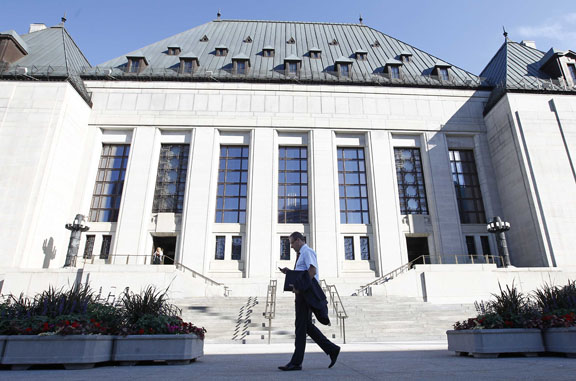The Supreme Court of Canada will hear four wide-ranging appeals this week including one that will be of interest to counsel regarding how much of their submissions judges can use in decisions without any attribution.
 Nov. 13
Nov. 13 — British Columbia —
Cojocaru v. British Columbia Women’s Hospital and Health CenterAppeals/Reasons for judgment: Monica Cojocaru’s son Eric suffered brain damage during his birth at the B.C. Women’s Hospital and Health Center. Cojocaru sued the hospital and its employees, who were found liable.$4 million in damages was awarded to Cojocaru. In the ruling, the judge copied large portions of the applicants’ closing submissions without attribution. The majority of the Court of Appeal allowed the appeals and ordered a new trial. The central question is under what circumstances can a trial judge adopt and incorporate submissions of a party, without attribution, into a judgment.
Nov. 14 — Ontario —
Antrim Truck Centre Ltd. v. R.Expropriation: The owner of Antrim Truck Centre applied to the Ontario Municipal Board for compensation for business damages after a new highway impeded road access to its truck stop. The board awarded damages for injurious affection. The minister of transportation appealed the order to the Divisional Court, which upheld the board’s decision, but the Court of Appeal allowed the minister’s appeal. The main question is whether the court, in applying the common law of nuisance, should require a balancing of social utility and reasonableness of the project against the property owner’s right to be compensated for interference from a public project.
Nov. 15 — Alberta —
Construction Labour Relations Association v. Driver Iron Inc.Commercial law: Driver Iron and an ironwork union agreed to the terms of a time-limited collective agreement for an oilsands project. The agreement was not renewed upon expiration. Instead, the two parties entered into a new agreement that wasn’t governed by the Labour Relations Code or enforced by either party as a collective agreement under the code. The Construction Labour Relations Association complained to the Alberta Labour Relations Board about the agreement, claiming only the CLRA was allowed to directly negotiate terms and conditions for Driver Iron’s employees. The board held the CLRA was the exclusive bargaining authority on behalf of Driver Iron, which was bound by the registration collective agreements. The application for judicial review was dismissed, the appeal was granted, and the case was sent back to the board. This case questions the tribunal’s position, specifically whether it needs to state on the face of its decision the manner in which it has addressed each argument made by all parties.
Nov. 16 — British Columbia —
D.J.W. v. R.Criminal law: D.J.W. was convicted of criminal negligence causing bodily harm after he tried to circumcise his four-year-old son on his kitchen floor. He was acquitted of aggravated assault and assault using a weapon. The trial judge found that in the years since his son’s birth, D.J.W. decided to “make things right with God.” The Court of Appeal granted the Crown’s appeal and dismissed D.J.W.’s appeal of his conviction. The court convicted D.J.W. of aggravated assault and assault with a weapon, and stayed the conviction for criminal negligence causing bodily harm, conditional upon the conviction for aggravated assault. At issue is whether the appeal court misapplied and misinterpreted the law regarding criminal negligence by imposing a purely objective test. There are publication bans in the case.

 Nov. 13 — British Columbia — Cojocaru v. British Columbia Women’s Hospital and Health Center
Nov. 13 — British Columbia — Cojocaru v. British Columbia Women’s Hospital and Health Center